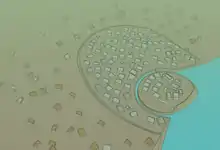
The Dykyi Sad archaeological site constitutes the remains of a fortified Cimmerian settlement, an ancient port city discovered in the Dykyi Sad park (Ukrainian: Дикий Сад, lit. 'Wild Garden') in Mykolaiv, Ukraine. The site is dated to the Bilozerska culture, around 1250–925 BC.[1][2]
Location
The garden was originally laid out by Admiral Greig when he was governor of the city. The garden got its name from the wild trees that did not bear fruit. Officially, the garden was called Admiral's Garden, but the name Wild was a popular one, due to its official name being changed over time.
The garden suffered greatly during the two world wars. Residents cut it down due to the lack of firewood and coal. After World War II, the garden was left as a wasteland, with only a few bushes growing. It was built up, but the name of the place remained the same.
Archaeological sites
Archaeological excavations are underway on the lands of the Dykyi Sad, which are free from construction. A settlement dating back to 1250–900 BC[3] with a highly developed culture of the Late Bronze Age was found.
This is the only steppe settlement of that era found in Ukraine. The settlement originated 500 years before the foundation of the Greek city-state of Olbia and existed for 300 years. The Wild Garden is the only surviving monument of the Black Sea port city from the time of the legendary Troy and the Trojan War.
On February 22, 2016, the Mykolaiv City Council published a petition to create an open-air park-museum, the Wild Garden settlement.
Researchers have proposed that the site is the "City of the Cimmerians" mentioned by Homer in the Odyssey.[4] Though the geography of the Odyssey is a contentious field, if true, this would make Mykolaiv the oldest city in Ukraine that is mentioned in written sources.[5] On February 22, 2016, the Mykolaiv City Council published a petition to create an open-air park-museum, the Wild Garden settlement.
Gallery
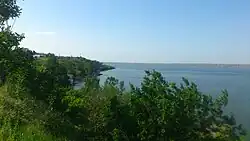
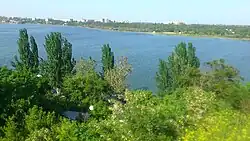
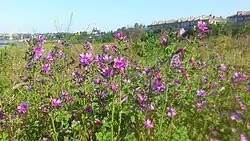

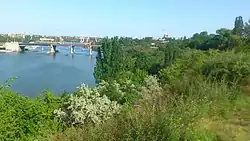
.jpg.webp)
References
- ↑ Gorbenko, Kirill; Grebennikov, Yuriy (2009). "The 'Dykyi Sad' fortified settlement as a uniting link in the context of economic, political and cultural relation of 1200-1000 BC (the Baltic Shore, the Pontic region and the Mediterranean)" (PDF). Baltic-Pontic Studies. 14: 375–390. ISSN 1231-0344. Retrieved 13 September 2016.
- ↑ Горбенко, К.В. (2014). "Городище "Дикий Сад" в контексте социально-экономических и культурных связей балтийского и черноморского регионов XІII–XI вв. до н.э." Известия Гомельского государственного университета имени Ф. Скорины. Nº 4 (85).
- ↑ "Cimmerian bridge, 3200 years old, excavated in Mykolaiv region". day.kyiv.ua. 25 August 2021. Archived from the original on 2021-08-26. Retrieved 14 April 2023.
- ↑ Odyssey xi.12.
- ↑ "Миколаїв невдовзі буде визнано найстарішим містом України". ua-travel.info. Retrieved 2016-09-13.
46°58′52″N 31°58′59″E / 46.981°N 31.983°E